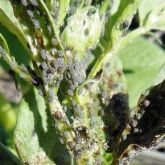Aphids
Alert
Queensland grain producers are urged to keep a look out for Russian wheat aphid (Diuraphis noxia). First detected in SA and Victoria in 2016, Russian wheat aphid quickly moved to NSW and Tasmania, and has recently been detected in Western Australia.
Russian wheat aphid causes significant damage to crops including wheat, barley, oats, rye, triticale, and many grass species and has not yet been detected in Queensland.
Producers should report unusual pests and unexplained symptoms to the Exotic Pest Plant Hotline on 1800 084 881 or Biosecurity Queensland on 13 25 23.

Cowpea aphid colony on faba bean
© M. Miles, Queensland Government

Winged cotton aphid with nymphs on cotton leaf
© T. Grundy, Queensland Government
A wide range of aphid species can affect field crops. Most are small, with oval-shaped green, brown or black bodies. They often form colonies.
Description
Aphid species found in cereal crops include:
- Diuraphis noxia—Russian wheat aphid
- Metopolophium dirhodum— rose-grain aphid
- Rhopalosiphum maidis— corn aphid
- Rhopalosiphum padi— oat aphid, wheat aphid
- Rhopalosiphum rufiabdominalis— rice root aphid.
Aphid species found in broadleaf field crops include:
- Acyrthosiphon kondoi—bluegreen aphid
- Acyrthosiphon pisum— pea aphid
- Aphis craccivora— cowpea aphid
- Aphis glycine—soybean aphid
- Aphis gossypii—cotton aphid
- Brevicoryne brassicae—cabbage aphid
- Lipaphis erysimi—turnip aphid
- Myzus persicae—green peach aphid
- Therioaphis trifolii—spotted alfalfa aphid.
Damage
Rarely cause major damage in most crops. Aphids suck on sap, causing loss of vigour, and in some cases yellowing, stunting or distortion of plant parts. Honeydew (unused sap) secreted by the insects can cause sooty mould to develop on leaves. In crops such as cotton, the honeydew affects fibre quality. Aphids can also be vectors (carriers) for viruses.
Control
Control measures are usually not warranted, as a range of parasites and predators keep population numbers down. Exceptions may be where:
- the crop is under moisture stress
- heavy populations are observed
- virus outbreaks are likely to be a problem.
Further information
- Watch the natural enemies of aphids in action (short videos)—The Beatsheet